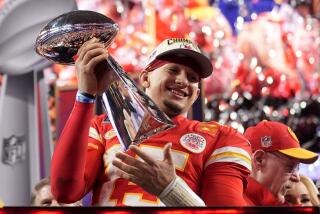Brady’s Bunch Could Be Super
- Share via
Before we all sit down to a new football season, here’s a take on the most recent NFL title game--a view that repairs the record, I’d say--varying, as this does, from the national perception:
* The notion that the St. Louis Rams’ offense was beaten by the New England Patriots’ defense last winter in Super Bowl XXXVI is false. Although it was a 17-3 game for three quarters, it was 17-17 in the fourth.
* The notion that New England’s Bill Belichick should be ranked now as a great head coach is false. After Belichick’s defense collapsed in the Super Bowl’s fourth quarter, he was saved by his young quarterback, Tom Brady, whose aggressive passing in the last 90 seconds drove the Patriots to the last-snap field goal that won it, 20-17.
* The notion that a great defense can beat a great offense in a big game is false. By the fourth quarter of the Ram-Patriot struggle, the momentum had passed to the Rams, who, both benches understood, would hold the edge in overtime.
Before it came to that, however, the game was won in regulation by the New England offense, which was more effective than any other 2001 offense whenever Brady was authorized to throw the ball. That was the rub. In the Super Bowl, he got the authority just in time.
Afraid to Throw
The Patriots’ problem until the last 90 seconds of 2001, in other words, was the coach’s fear of the thrown ball--Belichick’s fear that Brady was more likely to pass for interceptions than first downs or touchdowns.
And that is precisely their problem once more in 2002 with the start of a new season this week.
They’re still the AFC’s best--the NFL’s best whenever Brady is throwing two thirds of the time, or thereabouts. And accordingly, if Belichick wants the Patriots to be a passing team this season they’ll win their second consecutive Super Bowl next Jan. 26 at San Diego.
But all last season and again this summer, most of the time, they were a running team, with Brady usually handing off. And to win the NFL as a running team, the Patriots will need more luck than they’ll ever get again.
Most obviously, in the playoffs last winter, they were lucky against Oakland in the tucked-ball snowstorm and then Pittsburgh, leading Steeler fans to predict that Pittsburgh will blow out New England in the new season’s first Monday night game on Sept. 9.
A year ago, Belichick, judging between Brady and veteran starter Drew Bledsoe after Bledsoe returned from injury, knew enough about offense to play Brady. He just didn’t know enough to use him until there was no other option. And for the Patriots, that proved all but fatal in Super Bowl XXXVI.
By waiting to green-light Brady until only 90 seconds remained, Belichick was taking an unpardonable gamble. He risked game and season on the premise that he could win a Super Bowl with his defensive team--a group that failed him ultimately--and with a running game on offense. That group failed him too.
Brady Not Alone
Belichick’s Super Bowl gamble was unnecessary. That was his crime. By game time, he had to have been aware of Brady’s remarkable talent. He knew--he had to have known--that his young quarterback could proceed profitably in the first and second quarters the way he played the last 90 seconds, throwing pass after pass after pass after pass.
Picture the New England team if its offensive players had played Ram-type football that day: On defense, the Patriots would have shut down Ram quarterback Kurt Warner, of course, as they did, for 45 minutes. On offense, Brady would have thrown on first down repeatedly, and often on second down--in the tradition of Warner or Joe Montana--for 45 minutes. And with 15 minutes to play, Belichick’s in front not by 17-3 but by what? Would you say 30-3? Maybe more.
It is worth noting that as the NFL’s 83rd season commences, many teams have the personnel for Ram-type football. What they lack is the right coaching: the right strategic awareness and-or courage on their coaching staffs.
If Warner and Brady can drive a passing machine--if they’ve found it easier and more productive to complete passes on first and 10 than third and anything--so would Aaron Brooks, Peyton Manning, Steve McNair, Donovan McNabb, Kordell Stewart, Jeff Garcia, Jim Miller, Mark Brunell, Drew Brees, Jay Fiedler and Tim Couch--not to mention, among others, Tampa’s best quarterback, Shaun King, and perhaps even one of the Johnsons there.
Five Perfect Shots
Is Brady really that good? Well, in the 2001-2 season, he was. At age 24, a 220-pound second-year pro standing 6 feet 4, he wasn’t throwing wild, fluky passes in the Super Bowl. He never does. Passing on every down as time ran out on Belichick, Brady was performing with the poise and manifest talent of a 10-year veteran. Each of his five winning passes was well-calculated and perfectly launched.
All last year, the NFL saw only one other thing like it: In that New England blizzard when Oakland was there for the playoffs, Brady, throwing on nearly every play, completed 18 of his last 19 passes to eject the Raiders, 16-13.
In the swirling snow that night, what the rest of us didn’t know about Brady was that he could throw that effectively in game pressure. But Belichick had to have known. He’d seen him in many games--and in practice every day.
After two years as his coach, Belichick must by then have been aware of the things that make Brady what he is: his character, intelligence, instincts, fortitude, zeal for the game and greed for the ball in high-pressure situations--not to mention the guy’s talent.
Even so, as superbly as Brady played in 2001-2 whenever granted the opportunity, Belichick needed the last 90 seconds of that long season to upset the Rams. What if he hadn’t had 90 seconds?
Rams Getting Stronger
Suppose only a minute remained when the Rams scored the Super Bowl’s tying touchdown. That could easily have happened, and that, surely, would have led to overtime, and what then?
Think about it. The Patriots were losing control in the fourth quarter. The Ram offense was finally playing like the Ram offense The New England defense was absolutely worn out, which is why a great head coach would never try to beat a bunch like the Rams with a defensive team. As the players all say, it’s much more exhausting to play defense than offense. Thus the Rams’ long, three-play, Super Bowl-tying touchdown drive in the fourth quarter that day was the simplest and swiftest of the game.
More of the same, exactly, was coming in overtime, and every player on the field knew it. For the Ram way under Mike Martz is to go for it. Martz is still the NFL’s most modern and most-aware coach, which leaves one question: Had New England won the overtime toss, would Belichick have ordered Brady to go for it too? On this coach’s long record, the answer, sports fans, is no. The Belichick way is to play defense and play for the breaks. Unless, providentially, 90 seconds remain.
As the 2002 season starts, it’s all up to Belichick again. If he’s learned that throwing the ball is the future of football, his passer will win him another championship. If he can’t conquer his urge to win conservatively with defense and a running-play offense, he won’t make it.
More to Read
Go beyond the scoreboard
Get the latest on L.A.'s teams in the daily Sports Report newsletter.
You may occasionally receive promotional content from the Los Angeles Times.










